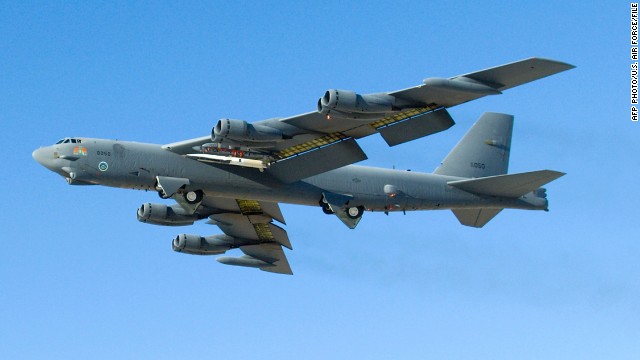U.S. B-52s flew over China's newly declared air zone, official says
November 26, 2013 -- Updated 2108 GMT (0508 HKT)
STORY HIGHLIGHTS
- 2 U.S. B-52 planes fly over China's newly claimed air zone, U.S. official says
- They don't tell China about their flight plans, as Beijing has said it wants
- The U.S. has sided with its Japanese allies against the new zone
- A Chinese official called the U.S. position "irresponsible," "unreasonable"
(CNN) -- Two U.S. military aircraft flew into China's newly claimed and challenged air defense zone over the East China Sea, a U.S. official said, an action that could inflame tensions between the world powers.
The large U.S. Air Force B-52 planes -- which were not armed because they were on a training mission -- set off Monday from Guam and returned there without incident. The mission lasted for several hours, and the aircraft were in China's newly declared air zone for about an hour, according to the U.S. official.
The planes' pilots did not identify themselves upon entering the disputed airspace, as China would have wanted, according to the official.
The official declined to be named because of the sensitivity of the situation.
The flights came two days after China unilaterally announced the creation of a so-called "Air Defense Identification Zone" over several islands it and Japan have both claimed. The two countries have been sharply at odds over those isles, which are believed to be near large reserves of natural resources.
Washington responded negatively to what Secretary of State John Kerry characterized as an "escalatory action (that) will only increase tensions in the region and create risks of an incident." And the U.S. government has rallied around its ally Japan, where thousands of its troops are stationed as part of a security treaty.
And specifically regarding China's new air defense zone, the United States has said it won't recognize it -- nor China's call that aircraft entering it identify themselves and file flight plans.
Beijing, though, has dismissed the American position as unjustified and urged Washington to butt out of the territorial dispute.
Chinese defense ministry spokesman Col. Yang Yujun on Sunday called such criticism "completely unreasonable," "irresponsible" and "inappropriate," telling the United States to stop taking sides and not send more "wrong signals" that could lead to a "risky move by Japan."
And China's foreign ministry lodged a formal complaint with U.S. Ambassador Gary Locke asking Washington "to correct its mistakes immediately."
Long-running dispute over islands
The disagreement centers around what's known as the Senkaku Islands by Japan and the Diaoyu Islands by China, which are close to strategically important shipping lanes and surrounded by waters full of rich marine life.
China says its claim to these islands extends back hundreds of years. Japan, on the other hand, says it saw no trace of Chinese control of the islands in an 1885 survey, so formally recognized them as Japanese sovereign territory in 1895. Japan then sold the islands in 1932 to descendants of the original settlers.
The dispute intensified in the second half of 2012.
Protests erupted in China after Japan announced it had bought several of the disputed islands from private Japanese owners. The deal was struck in part to prevent the islands from being bought by the controversial Tokyo governor, Shintaro Ishihara, who had called for donations for a public fund to buy them.
This sale outraged China's government, and groups of its citizens who protested violently in several Chinese cities, calling for boycotts of Japanese products and urging the government to give the islands back.
In December 2012, the dispute escalated further when Japan scrambled fighter jets after a Chinese plane was seen near the islands. That situation has recurred repeatedly since, and China's latest announcement makes it likely it will keep happening.
At sea, Chinese ships have frequently entered contested waters despite warnings from the Japanese Coast Guard.

No comments:
Post a Comment